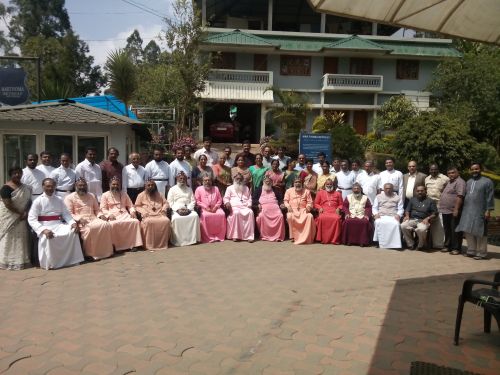The commission for dialogue between the Mar Thoma Syrian Church and the Old Catholic Churches of the Union of Utrecht met at the Mar Thoma Retreat Centre (Munnar, Kerala, India) from 17–19 February 2014. Prior to the meeting, the delegates attended the yearly Maramon Convention where they participated in the worship and heard the preaching by both Mar Thoma and international speakers. The Old Catholic delegation was also invited by the Episcopal Synod and the Sabha Council of the Mar Thoma Syrian Church and addressed by the Metropolitan, the Most Rev. Dr. Joseph Mar Thoma Metropolitan. The members of the commission are most grateful for the generous hospitality of the Mar Thoma Syrian Church, its Metropolitan, bishops, clergy and laity during these days. This spiritual and practical hospitality of the Mar Thoma Syrian Church provided an important and inspiring paradigm for the hospitality and welcoming attitude of the two traditions towards each other during the meeting.
During the meeting, the following topics were addressed: The reception of ecumenical councils; the role of symbols and icons in the life of the church; inculturation; faith, life, practice and ethics; and prospects for the future of the relationship between the two churches. In doing so, the commission followed and completed the agenda set at the meeting of 7–11 November 2011 in Santhigiri Ashram (Aluva, Kerala, India). Theologians of both churches presented papers on all of these topics. It was a reason for much gratefulness that there was much mutual recognition of the two churches in each other’s positions. It was felt that the dialogue helped both churches to receive the faith of the early church afresh for a new day. In this statement, brief sketches of the respective traditions’ positions will be offered as well as a formulation of the consensus that was reached. The delegation of the Mar Thoma Syrian Church consisted of The Rt. Rev. Dr. Zacharias Mar Theophilus Suffragan Metropolitan (co-chair), The Rt. Rev. Dr. Isaac Mar Philoxenos, The Very Rev. Prof. Dr. K.G. Pothen, the Rev. Sam T. Koshy, and the Rev. Shiby Varghese; the delegation of the Old Catholic Churches of the Union of Utrecht consisted of The Rt. Rev. Dr. John Okoro (co-chair), The Rt. Rev. Dr. Harald Rein (observer), The Rev. Dr. Adrian Suter, and The Rev. Prof. Dr. Peter-Ben Smit.
Review of the dialogue process
At the end of this stage of the dialogue process, it is possible to review the results so far and to formulate conclusions on the basis of that. Therefore, a systematic review of the dialogue process so far is presented here:
- The Mar Thoma Syrian Church of Malabar and the Old Catholic Churches of the Union of Utrecht are both in full communion with the Churches of the Anglican Communion. Therefore, the commission concentrated upon certain areas of discussion, either because these seemed potentially controversial, or because the commission hoped that a discussion would be particularly enriching. A systematic approach which deals with all aspects of the faith seemed not to be necessary.
- The two Churches have pursued very different paths in history. The Mar Thoma Syrian Church is rooted in the Syriac tradition and the tradition of its reformation of 1836, which was influenced by the Church Mission Society. Though the church was under Portuguese and Roman Catholic hegemony from 1599 onwards, it established its autocephaly in 1653. The Old Catholic Churches are rooted in the Latin catholic tradition; they consider themselves in continuation with various conciliar movements in the Western church that were in conflict with the See of Rome and its universalist claims. Their existence outside of the Roman communion started in 1723 in the Netherlands, and after the First Vatican Council (1870) in other countries.
- Both Churches underline the importance of being rooted in the tradition of the Ancient Church. For the Mar Thoma Syrian Church, the Ecumenical Councils of Nicaea, Constantinople and Ephesus are of high importance and remembered in the liturgy of Holy Qurbana and the other sacraments. The theological reflection within the Mar Thoma Syrian Church has come to rediscover the richness of the early Syriac teachers of the faith. The Old Catholic Churches refer to the seven Ecumenical Councils of the first millennium, while acknowledging that the later councils sought to further develop the faith that had been confessed by the earlier ones. A rediscovery of the Eastern patristic tradition has greatly influenced Old Catholic thinking.
- Both churches uphold the importance of participatory decision making and the responsibility of both clergy and lay people. In the Mar Thoma Syrian Church, the main decision-making bodies are the Episcopal Synod, the Sabha Council, and the Prathinidhi Mandalam (General Assembly); the latter two include a majority of lay people. The Old Catholic Churches have their national synods, which also include a majority of lay people, as well as different other national bodies, and the International Bishops’ Conference.
- Concerning potentially controversial areas, the commission is pleased to find substantial agreement in all of its discussions: In Christology, the faith is substantially the same, although Old Catholic theology is used to expressing it in
 Chalcedonian terms, while this is not the case in the theology of the Mar Thoma Syrian Church. Consensus could also be reached on the question of Scripture and tradition. In the theology of sacraments, the role of Mother of the Lord and of the saints, the remembrance of the faithful departed as well as the theology of symbols and icons, there are differences in practice and interpretation, but the underlying faith is the same. As for other differences in church life and ethical understanding, these are clearly due to the cultural differences between India, the home of the Mar Thoma Syrian Church, on the one hand, and Western and Central Europe, the home of the Old Catholic Church, on the other hand. The discovery that consensus could be reached on these potentially controversial subjects deepened mutual trust and strengthened the will to proceed further on the common ecumenical path towards unity.
Chalcedonian terms, while this is not the case in the theology of the Mar Thoma Syrian Church. Consensus could also be reached on the question of Scripture and tradition. In the theology of sacraments, the role of Mother of the Lord and of the saints, the remembrance of the faithful departed as well as the theology of symbols and icons, there are differences in practice and interpretation, but the underlying faith is the same. As for other differences in church life and ethical understanding, these are clearly due to the cultural differences between India, the home of the Mar Thoma Syrian Church, on the one hand, and Western and Central Europe, the home of the Old Catholic Church, on the other hand. The discovery that consensus could be reached on these potentially controversial subjects deepened mutual trust and strengthened the will to proceed further on the common ecumenical path towards unity. - Concerning mutual enrichment, discussions on spirituality, mission and inculturation proved to be particularly interesting. The interaction between different theological methodologies and approaches was very fruitful, and it was an especially enriching experience to see that they led to very similar results. Historical background information on the roots and the development of the two churches was extremely helpful to understand both the theology and the practice of the two churches. The dialogue was also greatly helped by the participation of both churches in the broader ecumenical movement and their commitment to the cause of ecumenism.
Concluding considerations
The members of the consultation rejoice in the spiritual fellowship that they experienced and in the mutually enriching exchange of views and the charitable discussions. On the basis of this consultation and the previous meetings of the dialogue commission, the members of the commission are of the conviction that their two churches share the same faith, which is also the faith of the early church. Therefore, they consider the formal establishment of a communion relationship, in analogy to the relationship of both churches to the Churches of the Anglican Communion, a very distinct and highly desirable possibility. With these concluding remarks, the commission respectfully submits this common statement to the Episcopal Synod of the Mar Thoma Syrian Church and the International Bishops’ Conference of the Union of Utrecht of the Old Catholic Churches, for their consideration. We hope to have assisted, by the grace of the Holy Spirit, in discovering more aspects of the unity in the faith of our churches and look forward to continuing this ecumenical journey as churches in communion.
Extract of the Munnar Statement of the consultation of the Mar Thoma Syrian Church and the Old Catholic Churches of the Union of Utrecht, Mar Thoma Retreat Centre, Munnar, Kerala, India, 17–19 February, 2014.

